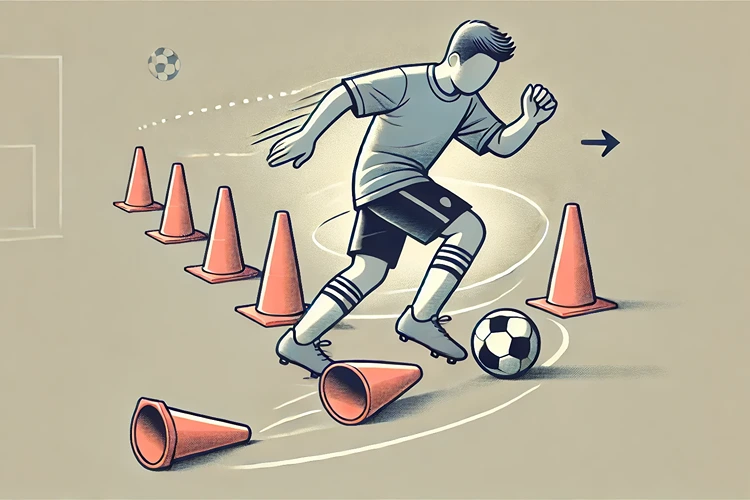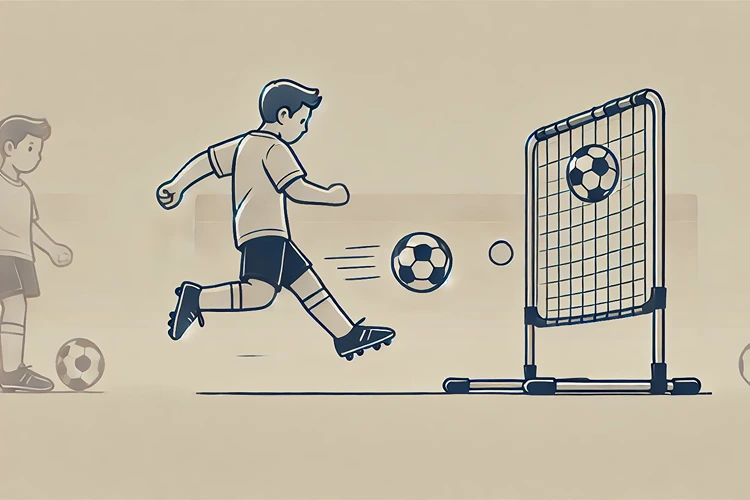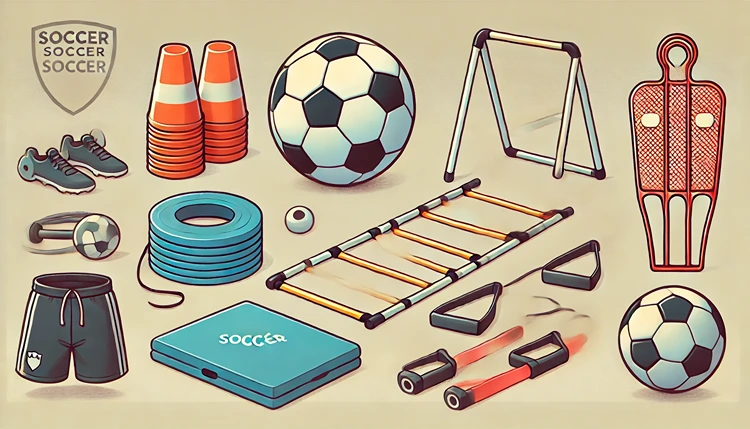Whether you’re aiming to become the next big soccer star or just looking to stay sharp, having the right soccer equipment for home training sessions can make all the difference. Training at home is convenient, flexible, and can be just as effective as practicing on the field if you have the right gear. In this article, we’ll walk you through the must-have soccer equipment for home training, from basic essentials to advanced tools that can help you up your game. Let’s dive into the best gear to keep you on your toes and help you reach your soccer goals from the comfort of your home.
Why Home Training is Essential for Soccer Players
Training at home has become more important than ever, especially with busy schedules and limited access to fields. It allows players to maintain and even improve their skills outside of team practices. Home training isn’t just a backup plan—it’s a vital part of any serious player’s routine. The right soccer equipment makes it easier to stay focused, practice consistently, and track progress. But with so many products on the market, it can be tough to know what’s worth your time and money.
Essential Soccer Equipment for Home Training
Let’s start with the basics. Whether you’re a beginner or an experienced player, these are the foundational pieces of equipment that will form the core of your home training setup.
Soccer Ball
No surprise here—the soccer ball is the most crucial piece of equipment. But not all soccer balls are created equal. For home training, you’ll want a ball that matches the quality of what you use on the field. Look for a ball that’s durable, has good grip, and is appropriately sized for your age and level. Brands like Adidas, Nike, and Puma offer reliable options.
Helpful Hint:
Consider having more than one soccer ball on hand. This way, if one loses air or gets damaged, your training session doesn’t have to come to a halt. Also, practicing with different ball sizes can help improve your control and adaptability on the field.
Cones and Markers
Cones and markers are essential for setting up drills and improving footwork. These simple tools help you create various training scenarios, from dribbling courses to agility drills. They’re inexpensive and can be used on almost any surface, making them perfect for home use. When purchasing cones, consider getting a set that includes different colors and sizes for more versatile training sessions.
Agility Ladder
An agility ladder is a fantastic tool for enhancing foot speed, coordination, and overall agility. It’s portable, easy to set up, and can be used for a wide range of drills. Regular use of an agility ladder can make a noticeable difference in your game, helping you move more quickly and efficiently on the pitch.
Stats:
According to a study published in the Journal of Sports Sciences, athletes who incorporated agility ladder drills into their training saw a 15% improvement in foot speed and agility within just eight weeks.
Resistance Bands
Resistance bands are a versatile tool that can be used for strength training, flexibility exercises, and injury prevention. They’re particularly useful for building strength in the lower body, which is crucial for powerful shots and quick sprints. Resistance bands come in various levels of resistance, so you can gradually increase the difficulty as you get stronger.
Advanced Soccer Equipment for Home Training
Once you’ve got the basics covered, you might want to step up your game with some more advanced gear. These tools can help you fine-tune your skills and track your progress over time.
Rebounder
A rebounder is an excellent tool for practicing passing, shooting, and first touch skills. It’s essentially a net that bounces the ball back to you, simulating game-like situations where you need to react quickly and accurately. Rebounders come in various sizes and designs, so you can choose one that fits your space and training needs.
Speed Parachute
If you’re serious about improving your sprint speed, a speed parachute is a great investment. This piece of equipment attaches to your waist and creates resistance as you run, helping to build explosive power and speed. It’s a bit more advanced, but it can be incredibly effective when used correctly.
Smart Soccer Ball
For those who love tech, a smart soccer ball can be a game-changer. These balls are equipped with sensors that track your kicks, spins, and shots, providing detailed feedback on your performance. This data can help you identify areas for improvement and set goals for your training sessions. Brands like Adidas and DribbleUp offer smart soccer balls with companion apps that make it easy to monitor your progress.
Setting Up Your Home Training Space
Now that you know what equipment to get, let’s talk about setting up your home training space. You don’t need a huge backyard or a dedicated room to create an effective training area—just a bit of creativity and organization.
Choosing the Right Location
The first step is finding a suitable spot for your training sessions. Ideally, you want a flat, open area with enough space to move around. If you have a backyard, that’s perfect. But even a driveway, garage, or a large room can work if you set it up right. Just make sure there’s nothing breakable nearby!
Creating a Safe and Comfortable Environment
Safety should always be a priority. Clear the area of any obstacles, make sure the surface is non-slip, and wear appropriate footwear. If you’re training indoors, consider using mats or rugs to protect your floors and provide some cushioning.
Helpful Hint:
Keep your training space organized by storing your equipment in bins or on shelves. This way, everything is easy to find when you need it, and your training area stays neat and safe.
Incorporating Technology
Technology can take your home training sessions to the next level. Use apps to track your workouts, follow online training programs, or even join virtual coaching sessions. Many smart soccer balls and other connected devices offer companion apps that provide real-time feedback and track your progress over time. This can be a great motivator and help you stay on track with your training goals.
Effective Training Drills for Home Sessions
Now that you’ve got your home training space set up and equipped, it’s time to put that gear to use. In this section, we’ll cover some effective training drills that you can do with the equipment mentioned earlier. These drills are designed to improve various aspects of your game, including ball control, agility, strength, and shooting accuracy.
Dribbling Drills

Dribbling is one of the most fundamental skills in soccer, and there’s always room for improvement. Using your soccer ball, cones, and markers, you can set up various dribbling drills to enhance your control and footwork.
Figure Eight Drill
This drill helps improve your ball control and agility. Place two cones about 5 yards apart. Dribble the ball around the cones in a figure-eight pattern as quickly as possible, keeping the ball close to your feet. Focus on using both feet and different parts of your foot (inside, outside, sole) to navigate the cones.
Helpful Hint:
To increase the difficulty, try doing the figure eight drill while keeping your head up, forcing yourself to rely on peripheral vision. This simulates game conditions where you need to keep track of opponents while maintaining control of the ball.
Zig-Zag Dribble
Set up a line of cones or markers in a straight line, spaced about 2-3 yards apart. Dribble the ball in and out of the cones using small, controlled touches. The goal is to navigate the cones as quickly as possible without losing control of the ball. This drill is excellent for improving quick footwork and changing direction with the ball.
Passing and Shooting Drills

Passing and shooting are crucial skills that can be practiced effectively at home, especially with tools like a rebounder or a wall.
Wall Pass and Shoot
If you don’t have a rebounder, a solid wall works just as well. Stand a few yards away from the wall and pass the ball against it. When the ball rebounds, control it and take a quick shot at an imaginary goal or target on the wall. This drill helps improve your passing accuracy, first touch, and shooting speed.
Rebounder Drills
For those with a rebounder, you can practice a variety of passing and shooting drills. Stand a few yards away and pass the ball into the rebounder. When the ball comes back, control it and quickly pass or shoot it again. This continuous movement helps improve your reaction time, accuracy, and ability to control the ball under pressure.
Agility and Speed Drills
Agility and speed are essential for outmaneuvering opponents on the pitch. Here are some drills using your agility ladder, cones, and speed parachute to help boost these skills.
Agility Ladder Drills
There are countless drills you can do with an agility ladder. Here are a couple of examples:
- One-Foot In: Step into each square of the ladder with one foot, alternating feet as you move through the ladder. Focus on speed and precision.
- Lateral In and Out: Stand to the side of the ladder. Step in with your right foot, then your left, and then step out to the side again. Move laterally through the ladder as quickly as possible.
These drills are great for improving your foot speed and coordination, which are crucial for quick changes in direction during a game.
Speed Parachute Sprints
To build explosive speed, attach a speed parachute to your waist and perform sprints in your training area. The resistance provided by the parachute will help build strength in your legs and improve your acceleration. Start with short sprints (about 10-20 yards) and gradually increase the distance as you get stronger.
Stats:
A study published in the International Journal of Sports Science found that athletes using resistance training methods like speed parachutes saw a 12% increase in sprint speed after six weeks of consistent training.
Maintaining Motivation During Home Training
Training at home can be challenging, especially when it comes to staying motivated. Without a coach or teammates pushing you, it’s easy to lose focus or skip sessions. Here are some tips to keep you motivated and on track with your home training.
Set Clear Goals
One of the best ways to stay motivated is to set clear, achievable goals. Whether it’s improving your dribbling speed, increasing your shot accuracy, or building endurance, having specific targets can help keep you focused. Break down larger goals into smaller milestones to give yourself a sense of progress and accomplishment along the way.
Track Your Progress
Keep a training journal or use an app to track your progress. Recording your drills, times, and improvements can provide a tangible sense of accomplishment and help you stay motivated. Plus, tracking your progress makes it easier to identify areas that need more focus.
Mix Up Your Routine
Doing the same drills every day can quickly become monotonous. To keep things interesting, mix up your routine regularly. Alternate between different drills, try new exercises, or incorporate different pieces of equipment. This not only keeps you engaged but also ensures that you’re developing a well-rounded set of skills.
Helpful Hint:
Consider setting up friendly competitions with yourself. For example, try to beat your previous best time on an agility drill or see how many times you can complete a specific drill without making a mistake. This adds a fun, competitive element to your training sessions.
Stay Connected with Teammates
If you’re missing the camaraderie of team training, stay connected with your teammates through virtual platforms. Share your progress, challenge each other to drills, or even set up virtual training sessions. This can help you stay motivated and maintain a sense of team spirit, even when you’re training alone.
Investing in Quality Soccer Equipment for Home Training
Investing in quality soccer equipment is not just about improving your home training sessions—it’s about setting yourself up for long-term success. High-quality gear is more durable, performs better, and can make your training more effective and enjoyable. It’s worth spending a little more on equipment that will last and help you achieve your goals.
Choosing Durable and Reliable Gear
When selecting soccer equipment, durability and reliability should be top priorities. Look for products made from high-quality materials and from reputable brands. Read reviews and ask for recommendations from other players to ensure you’re getting the best gear for your needs.
Balancing Cost and Quality
While it’s tempting to go for the cheapest options, it’s important to balance cost with quality. Investing in good equipment upfront can save you money in the long run by reducing the need for frequent replacements. However, that doesn’t mean you need to buy the most expensive gear—just make sure you’re getting good value for your money.
Where to Buy Soccer Equipment
There are many places to buy soccer equipment, both online and in stores. Popular online retailers like Amazon, Soccer.com, and Dick’s Sporting Goods offer a wide range of products. For those who prefer to shop in person, local sporting goods stores are also a great option, and you can often find knowledgeable staff to help with your selection.
Essential Home Training Equipment: Quick Reference Guide
| Equipment | Purpose | Recommended Brands |
|---|---|---|
| Soccer Ball | Practice dribbling, passing, shooting | Adidas, Nike, Puma |
| Cones & Markers | Set up drills, improve footwork | SKLZ, Kwik Goal |
| Agility Ladder | Enhance speed and coordination | Profect Sports, Yes4All |
| Resistance Bands | Strength training, injury prevention | TheraBand, Fit Simplify |
| Rebounder | Improve passing, first touch | SKLZ, Franklin Sports |
| Speed Parachute | Build explosive sprint speed | AGPTEK, Speedster |
| Smart Soccer Ball | Track performance, set goals | Adidas, DribbleUp |
FAQs
Wrapping Up
Home training can be just as effective as training on the field, especially when you have the right soccer equipment. From essential items like a quality soccer ball and cones to advanced tools like a rebounder and smart soccer ball, investing in the right gear can significantly enhance your skills. Remember, the key to successful home training is consistency, creativity, and a clear focus on your goals. With the right setup and mindset, you can elevate your game from the comfort of your own home. Keep pushing yourself, stay motivated, and make the most out of every session. Whether you’re a beginner or a seasoned player, the journey to improvement is ongoing, and your home is the perfect place to start.

